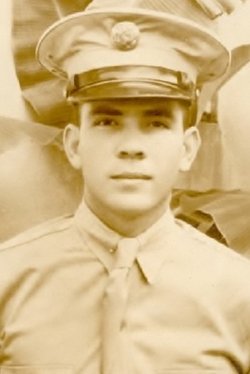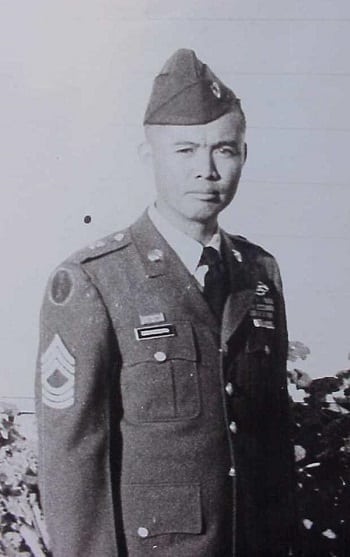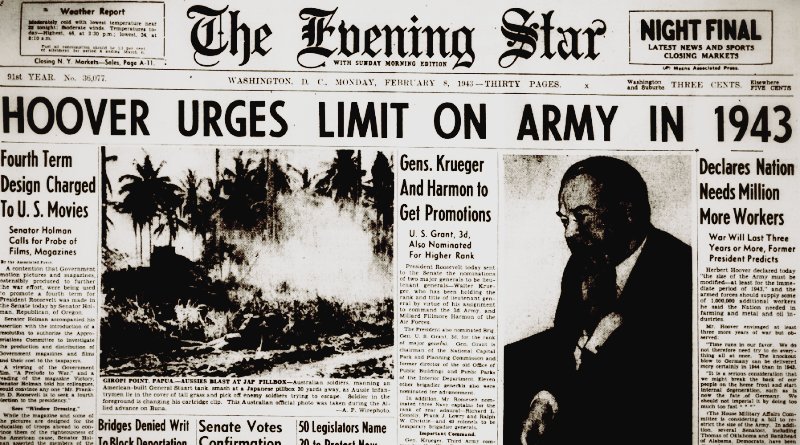World War II Chronicle: February 8, 1943
Click here for TODAY’S NEWSPAPER
The front page reports that several generals will be pinning on new stars: Pres. Ulysses S. Grant’s grandson, Ulysses S. Grant III is to become a major general. In the early days of the war he was in Fort Leonard Wood, commanding the Engineer Replacement Training Center. Now he is in charge of our civil defense. Promoted to lieutenant general are Walter Krueger, commanding general of Third Army, and Millard F. Harmon, commanding Army Forces in the South Pacific…
Regarding the five D.C.-area prisoners of war:
- 2nd Lt. Irvin R. Sutphin, of Company B, 31st Infantry, died of malaria on Aug. 9, 1942
- Staff Sgt. William K. Davis, 48th Materiel Squadron, left boarding school and lied about his age to join the military. He died on Oct. 7, 1942
- Warrant Officer Junior Grade William Wirship, 59th Coast Artillery, will perish when the hellship Arisan Maru is sunk on Oct. 10, 1944

No information can be found on the other two men mentioned… Page seven mentions Cpl. Narcisco Ortilano of the Philippine Scouts, who earned the Distinguished Service Cross last year when his machine gun position was attacked by an 11-man enemy patrol. Ortilano put down four of the Japanese soldiers with his machine gun until it jammed. Then he switched to his pistol, dispatching five more before he ran out of ammunition. Then the remaining enemy charged him with their bayonets. The first attacker wounded him, but Ortilano was able to kill the enemy and use that rifle to finish off the last man.

Although he was captured and subjected to the nightmare that was the Bataan Death March, Ortilano manages to survive captivity… George Fielding Eliot column on page eight… Sports on page 11… A Marine officer managed to outdo Cpl. Ortilano, single-handedly cutting down 27 Japanese soldiers on tiny Tanambogo Island, about 25 miles north of Guadalcanal (see page 12). 2nd Lt. Samuel C. Turner will earn the Silver Star on Tarawa, and Capt. Turner is killed in action on Saipan in 1944.
Roving Reporter by Ernie Pyle
A FORWARD AIRDROME IN FRENCH NORTH AFRICA — It is a long jump from teaching grade school in Indiana to leaping out of an airplane 11,000 feet over some African mountain, but Tom Thayer made it.
He hopes his next jump will be right back to an Indiana farm, and there he’ll stay.
Tom Thayer is “the hope of Hoosierdom.” as they boys call him. He is from Hope, Ind. Tom is 27, weighs 200 pounds, taught the fifth and sixth grades for five years at Clifford, Ind., and is now the navigator of a Flying Fortress. They say he is the best celestial navigator in his squadron.
Not long ago a bunch of Fortresses started a bombing trip to Bizerte. Over the mountains they ran into stormy, freezing weather. The ship Tom was navigating iced up and went out of control.
The captain gave the order over the intercom for the crew to put their parachutes on and get ready to jump. A minute later he gave the order to jump.
Lieutenant Thayer was first on the list. He opened the escape hatch and out he went.
Now in the next few second some other things happened. The other men didn’t jump immediately, because they couldn’t get the ball turret gunner out of his turret. While they were pulling and tugging at him, the captain got some control over the plane. Then he ordered the bombs salvoed — which means dropped so they won’t explode — and that gave him still more control. Then he countermanded the order to jump.
But our poor Tom was already halfway to earth. The plane returned safely to base in less than an hour. It took Tom four days.
After his parachute opened, Tom says, he could still see the plane but it seemed to be below him instead of above. He thought he must be falling up. He hasn’t figured it out yet.
He dropped through several thousand feet of clouds, still holding his ripcord, for he knew if he saved it he would become a member of some club, although he couldn’t remember its name — the Caterpillar Club. Anyhow his hand finally got so cold he threw the ripcord away.
The mountains where he landed were very rocky. His head struck as he came down, and he bled a good deal. He was conscious, but couldn’t get up for about five minutes.
He says the mountains were full of Arabs working in the fields. He walked a short way and spoked to one, but not knowing the language, he didn’t get very far. It was only 4:30 in the afternoon, but Tom lay down for a nap. Pretty soon he found the fleas were keeping him awake. He figured he was safe for sure then.
Finally he got some donkeys, lashed a sheep’s carcass on top of one of them, got aboard another one himself, and started out.
The donkeys were very little and Tom is very big, and when riding on the edges of chasms the little shelf was just wide enough for the donkey. Tom could feel his long legs reaching in vain for the ground.
He finally arrived at a French garrison. He tried to pay them for taking care of him, but they wouldn’t take any money. However, some photographs from his wallet fascinated them and they indicated a desire for some of them. So Miss Mary Scott, of Shelbyville, Ind., will be interested to know that her photograph now reposes on a French soldier’s mantle.
At any rate, Tom says he’s going to marry Mary the day he gets home, and then start farming and never stop.
For a while Tom was pretty sore about the others not jumping too, but he was all over that by the time he got back to the airdrome. They say he’s the best natured guy in the outfit. Nobody had ever seen him mad, so they decided to rib him. One man rushed up and shook hands and said:
“Tom, you made a mistake. The captain didn’t say ‘Bail out. He said, ‘Look, hail out.'” They had him fooled for a minute.
Tom’s dad used to be county auditor back home. He had one term and then got defeated last fall by only 133 votes. The boys kid Tom and say that if he’d only had the gumption to make his spectacular jump a couple of months earlier, his father could no doubt have been reelected on the strength of it.
Evening star. (Washington, D.C.), 8 February 1943. Chronicling America: Historic American Newspapers. Lib. of Congress.
https://chroniclingamerica.loc.gov/lccn/sn83045462/1943-02-08/ed-1/
